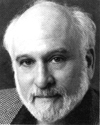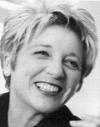 Rafi Zabor, whose new book, I, Wabenzi, is excerpted in this issue (“Too Much,”), writes: “The opening of I, Wabenzi was the first aesthetically successful, living thing I was able to write several years into the aftermath of my parents’ deaths, in 1985 and ’86. It was intended to be a piece about one hundred pages long about the strictly car-related incidents in my travels across Europe and into Asia in a used Mercedes I’d bought for the purpose, but with the second chapter, excerpted here, it became the massive disgorgement of material intended to explain the journey and the purchase of the car. This material has so far overwhelmed the travel story, and I’m running with the joke. I expect to actually buy the olive green 1978 280SE in the summer of 1986, near the beginning of Volume Three. Half of the second volume is already written, but I’m still stuck in an English farm full of Sufis in 1972.”
Rafi Zabor, whose new book, I, Wabenzi, is excerpted in this issue (“Too Much,”), writes: “The opening of I, Wabenzi was the first aesthetically successful, living thing I was able to write several years into the aftermath of my parents’ deaths, in 1985 and ’86. It was intended to be a piece about one hundred pages long about the strictly car-related incidents in my travels across Europe and into Asia in a used Mercedes I’d bought for the purpose, but with the second chapter, excerpted here, it became the massive disgorgement of material intended to explain the journey and the purchase of the car. This material has so far overwhelmed the travel story, and I’m running with the joke. I expect to actually buy the olive green 1978 280SE in the summer of 1986, near the beginning of Volume Three. Half of the second volume is already written, but I’m still stuck in an English farm full of Sufis in 1972.”
 Tracy Cochran spoke with Mu Soeng (“Dharma for Sale,”) about the treatment of Buddhism in Western capitalist societies. She tells us: “It felt important to start a public conversation about it because people have been thinking about it and talking about it privately for some time. I went to interview Mu Soeng understanding that Buddhist teachers and retreat centers in a capitalist culture have to handle money. They have to find ways to survive and thrive in the marketplace, just like the rest of us. Yet I came away appreciating the value of being radically honest about what really can be bought and sold. Can true awakening be an aquisition?”
Tracy Cochran spoke with Mu Soeng (“Dharma for Sale,”) about the treatment of Buddhism in Western capitalist societies. She tells us: “It felt important to start a public conversation about it because people have been thinking about it and talking about it privately for some time. I went to interview Mu Soeng understanding that Buddhist teachers and retreat centers in a capitalist culture have to handle money. They have to find ways to survive and thrive in the marketplace, just like the rest of us. Yet I came away appreciating the value of being radically honest about what really can be bought and sold. Can true awakening be an aquisition?”
 Pico Iyer’s review of Journey for Peace: His Holiness the 14th Dalai Lama appears here. “I’ve been visiting the Dalai Lama in Dharamsala for more than thirty years now, and writing on him constantly for more than twenty, listening to him in Harvard in 1979, in Nara in 2003, and many places in between. But when I went to attend his teachings in Zurich this summer and suddenly came upon Manuel Bauer’s book of photographs of His Holiness, I realized I was seeing him in the round, getting to absorb his company on the page at a level deeper than words, for the first time. I returned to my room and-the incorrigible writer!-tried to put what I had seen in Bauer’s pictures into some less transporting images of my own. My most recent book, Sun After Dark, contains long chapters on the Dalai Lama, Tibet, and the riddles that surround them, and I am currently working on a much fuller work on the same theme.”
Pico Iyer’s review of Journey for Peace: His Holiness the 14th Dalai Lama appears here. “I’ve been visiting the Dalai Lama in Dharamsala for more than thirty years now, and writing on him constantly for more than twenty, listening to him in Harvard in 1979, in Nara in 2003, and many places in between. But when I went to attend his teachings in Zurich this summer and suddenly came upon Manuel Bauer’s book of photographs of His Holiness, I realized I was seeing him in the round, getting to absorb his company on the page at a level deeper than words, for the first time. I returned to my room and-the incorrigible writer!-tried to put what I had seen in Bauer’s pictures into some less transporting images of my own. My most recent book, Sun After Dark, contains long chapters on the Dalai Lama, Tibet, and the riddles that surround them, and I am currently working on a much fuller work on the same theme.”
 Helen Tworkov, who founded this magazine in 1991, reports that when Peter Gregory of Smith College first contacted her to participate in the “Women Practicing Buddhism: American Experiences” conference, “It was just after the 2004 presidential election and I just kept thinking, how does this relate to what is happening in the world’ What I came with may be somewhat idealistic, but given the current political climate, even idealism functions as a pragmatic subversive alternative.” Her essay, “Just Power,” appears here.
Helen Tworkov, who founded this magazine in 1991, reports that when Peter Gregory of Smith College first contacted her to participate in the “Women Practicing Buddhism: American Experiences” conference, “It was just after the 2004 presidential election and I just kept thinking, how does this relate to what is happening in the world’ What I came with may be somewhat idealistic, but given the current political climate, even idealism functions as a pragmatic subversive alternative.” Her essay, “Just Power,” appears here.
Thank you for subscribing to Tricycle! As a nonprofit, we depend on readers like you to keep Buddhist teachings and practices widely available.